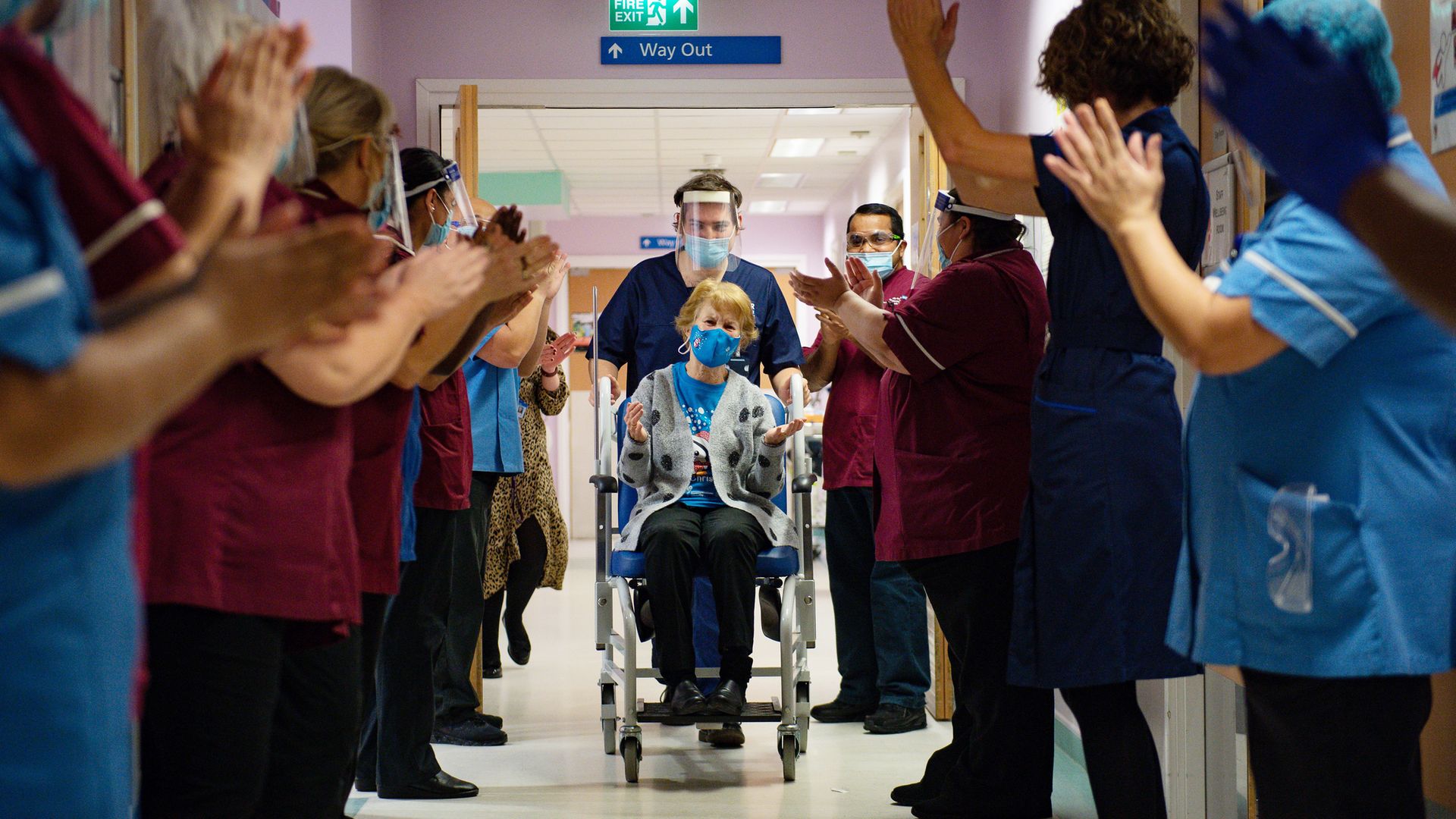
It has been tested like never before, but our sense of society has received a boost rather than a blow from Covid, says ZOE WILLIAMS.
I had volunteered to help with corona testing admin at a local secondary school, and they wanted to do an interview first. Weird, I thought, as I already had a DBS certificate, and what did they need to know for a role like this, besides that I have no history of violent crime? Well, they didn’t need a lot, but what they did ask was heavy and existential: why do you want to help us?
This was dauntingly complex: it’s not because I think performing lateral flow tests on teachers is going to be a game-changer in beating the virus. There’s a high rate of false negatives, the MHRA is iffy about the ethics and most of the teenage dirtbags aren’t even in school. I decided to just open my mouth and see what happened.
I said I felt that teachers hadn’t seen any of the gratitude that other public servants had, despite putting themselves at risk every day; that they’d been kept in the dark by a dithering government, then used as landfill in the mountains of blame piling up for decisions they’d had nothing to do with; and, while MPs got 10 grand each to titivate their multiple homes for Zoom purposes, teachers had had nothing to help them adapt to remote work, except snide remarks to the effect that they were probably glad the schools were closed, when they’ve given their lives to the education of the nation’s children. That’s why I want to learn how to correctly soak the swab in the testing fluid. To say I’m grateful, and maybe indicate that we all are.
“Well, that was a slam dunk”, I thought, once my mouth had finally closed on this endless sentence. The unfamiliar thing was, I also meant it. Sure, I’d always have said that in the abstract: but actual gratitude, a working emotion, circuits live, batteries fully charged, bright enough to see by? This is new.
One crushing realisation of the past 10 months has been that the world can change immeasurably, while one’s own shortcomings remain the same. I ended the first lockdown knowing that, even when time stands still, I can waste it; even when I don’t go anywhere, I can still lose my wallet. It’s one thing to create chaos from disorder, but it turns out I can do it in a vacuum. As arcs of self-discovery go, it was medium-engrossing but also lame, like the dramatic unfolding of a box set you’ve already seen.
But I was looking for change in the wrong places; all our social relationships, from the closest to the most distant, have been transformed. It just wouldn’t necessarily show up in how fast we could work through a to-do list.
The NHS saw an immediate outpouring of the only thing we could figure out how to do, clap on doorsteps. Children painted rainbows, estate agents put up signs, takeaways and graffiti artists did their part; gratitude was something we would all have said before 2020, in the abstract, but surely never felt so keenly.
The moment was duly hijacked by the government, who rebranded the sentiment – “clap for heroes” – and sought, with their own performative and heavily televised clapping, to turn it into an edict. Johnson et al wrestled something sincere and spontaneous into an altogether different message, one that was both their idea, and indicative of support for all their other ideas.
Probably one of their behavioural units said this would work. Instead, people stopped clapping; it was depressing, a parable in miniature of what Conservatives have been doing for the past decade, taking all our pro-social urges, all the subtle ways in which we love one another, and using them as cover for loveless policy. Who needs a social safety net and functioning public services when you have a Big Society, raring to go? You guys love each other, right?
But I was wrong to be so dispirited: that gratitude didn’t evaporate. British social attitudes to the NHS have always been tremendously positive, but previous to the pandemic, it was more a collective, generalised pride in the institution, as something we all built and all maintain. That was a genuine but amorphous sentiment, which could be pressed into the service of more or less any agenda.
All that has changed; nobody was painting rainbows to thank the Beveridge Report: they were for real people, to whom a real debt is owed. This scorches the earth for austerity 2.0; it’s doubtful that public sector pay freezes can ever look like a necessary evil after this, unless they begin and end with the budget of Dido Harding.
The issue of child poverty is related but distinct: after a decade of soaring food bank use, politicians developed an operating model of the British public, in which we weren’t wild about children going hungry but we could live with it for the sake of balancing the books. That turns out not to be true. Was it the juxtaposition of all those millions hosed at Eat Out to Help Out, by a government that whined and dragged its feet over feeding children for the half term holiday? Or was it the visual shock of what a family’s food hamper actually contained, that really rammed home the outrage of what people are going through?
Those of a spiritual bent might chalk it up to Marcus Rashford, a young man pure of heart reminding an amnesiac culture what a moral compass looks like. Either way, this scandal has undermined both the acceptance of child hunger as a regrettable reality, and the somnambulant surrender to a political class whose words don’t match their votes. We can anticipate this issue being a muster point for pressure on all kinds of issues, from the cuts to Universal Credit to free broadband.
There has been a subtler shift in our perception of the social: hundreds of thousands of people have missed out on seeing their closest relatives, because of care home rules, and hundreds of thousands have lost loved ones. However, many of us have, through the relaxation of rules over summer or, lately, support bubbles, seen our families, yet are still gripped by a sense of loss and longing, for friends and distant acquaintances, strangers, crowds, moments of levity shared on the carriage of a commuter train.
It turns out society is big: it’s more than small, tight, nuclear units of blood relationships, and its meaning derives as much from a thousand moments of fleeting intimacy as from the major wellsprings of one’s emotional life. Your family might be the tent pegs, but the canvas is everyone else. Cassandras insist that social distancing will go on for years, that we’ll never casually shake one another’s hands again, nor gather in our thousands for trivial purposes. This safety-first pessimism misses an important shift that’s already underway: we miss strangers because they matter.
So even if we perceive, individually, that we haven’t changed for better or for worse, I think we have undergone a collective change that we won’t fully realise until we’re once again able to collect. We will bounce back, but not in the way that Rishi Sunak means.










